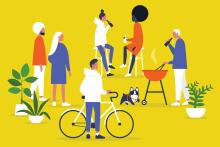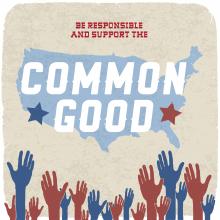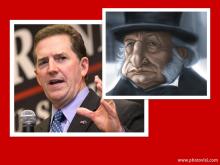budget as a moral document

FOR SOME REASON, conversations about economics and the church are rare these days — even though scripture includes more than 2,000 verses on poverty, such as laws in the Hebrew Bible on debt, labor, and land ownership. In the gospels, Jesus had many conversations with people about their relationship to money.
Our daily lives wade in the waters of economics, even in the most ordinary ways. When I brushed my teeth this morning, for instance, I used a brand-name electric toothbrush and a brand-name toothpaste, one that claims to be gentle on tooth enamel. After leaving my apartment, I gazed ahead to the street corner, where a man with a familiar face extended his hand in need to passersby. On the streets of New York City, the human cost of economic insecurity is painfully evident. I made my way eastbound toward Park Avenue; the potholes had me pondering how my hood is often overlooked in the city’s infrastructure budget. Yet, somehow, new “affordable” luxury apartments pop up, seemingly out of nowhere; I sometimes wonder if these buildings just appear overnight, ready-made. I’m also reminded that our local community board, through its land use committee, had some say in these new developments.


Politics at its best serves the common good — far above any one interest or political party. And right now in Washington, we see that playing out as we continue to reach accord on immigration reform. But when it comes to our budget debate, partisan ideology and special interests are winning out over the common good.
The ever-looming “sequester” that was never supposed to happen goes into effect tomorrow. Billions of dollars will be cut from domestic and military spending without any plan or strategy; jobs will be lost and people will suffer. Public frustration is growing with our elected officials, while they continue to argue over the role of government instead of governing responsibly. The press discusses who wins and loses in the polls, but it is clear that it is the common good that is losing.
On the other hand, immigration reform is being discussed, at the same time with the same political players, in a very reasonable and hopeful way. On that important policy change, bipartisan work is going forward to shape legislation that could pass both houses of Congress.

Both Republicans and Democrats have a religion problem and it has nothing to do with same-sex marriage, abortion or religious liberty. Rather it is budgets, deficits, and debt ceiling deadlines that are their serious stumbling blocks.
That’s right, in a city deeply divided between the political right and left there is a growing consensus from religious leaders about getting our fiscal house in order and protecting low-income people at the same time. Together, many of us are saying that there is a fundamental religious principle missing in most of our political infighting: the protection of the ones about whom our scriptures say God is so concerned.
Indeed, the phrase “a budget is a moral document” originated in the faith community, and has entered the debate. But those always in most in jeopardy during Washington’s debates and decisions are precisely the persons the Bible instructs us clearly to protect and care for — the poorest and most vulnerable. They have virtually none of the lobbyists that all the other players do in these hugely important discussions about how public resources will be allocated.
For us, this is definitely not a partisan issue, but a spiritual and biblical one that resides at the very heart of our faith. It is the singular issue which has brought together the U.S. Conference of Catholic Bishops, the National Association of Evangelicals, the Salvation Army, and the leaders of church denominations, congregations, and faith-based organizations across the nation.

“Evangelical voters” have now been sized and squeezed into a homogeneous political block. These folks have views on the political right wing, trust in robust American military might, believe that wealth is a blessing to be protected by tax policy, want society to be inhospitable toward gays, oppose any form of abortion, feel that “big” government is always malevolent, and assert that American individualism is the divinely sanctioned cornerstone of the Republic. Apply the label “evangelical” to a voter and you can expect these political responses.
The problem is that it’s simply inaccurate. One size doesn’t fit all when in come to evangelicals. It distorts reality. But that’s just too inconvenient for pundits intent on predicting how various blocks will vote.
According to the Chicago Tribune, new study from Northwestern University attempts to shed light on what the 1 percent actually believes about charitable giving and social problems. The study found that of the more than 100 interviewees with a median annual income of $7.5 million, most were enthusiastic about philanthropy and 92 percent were involved in some kind of volunteer activity. Furthermore, the great majority of respondents cited budget deficits, unemployment, and education as the most pressing issues in the United States today.
So, maybe the 1 percent isn’t so different from the 99 percent?
Wrong.

Sen. Jim DeMint recently released a plan to cut the federal deficit with $4.2 trillion in spending cuts. And guess what he wants to cut?
Seventy percent of the cuts would come from safety net programs that assist low-income people, including eliminating the earned income-tax credit and child tax credit.
Even an analyst for the American Enterprise Institute objected, saying, "It's comprised completely of spending cuts and no tax increases, but then targets the lower-income programs while sparing the big middle-class programs. They could have designed a spending-cut program that was more balanced …”
The news brought to mind a parable from the mid-1800s.
In the opening scene of Charles Dickens’ A Christmas Carol, Ebenezer Scrooge is approached by two earnest gentlemen. "At this festive season of the year, Mr Scrooge,'' said the gentleman, taking up a pen, ``it is more than usually desirable that we should make some slight provision for the Poor and destitute, who suffer greatly at the present time. Many thousands are in want of common necessaries; hundreds of thousands are in want of common comforts, sir.''
Stefan Fritz, a second-year seminary student at North Park Theological Seminary, speaks to Covenant Media Services on November 16, 2011 about North Park University Justice League discussing their partnership with the Sojourners Circle of Protection campaign.
"The time has come to put actions to our prayers, our values and act our morals," Fritz said. "And it's time for us to call upon our political leaders to act justly....We will fight together to protect these social programs that our country needs so desperately."
Watch video of Fritz's interview about today's Human Circle of Protection action in Chicago inside.